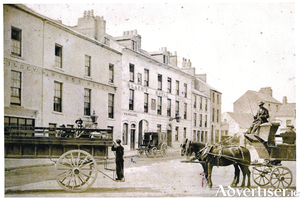Search Results for 'Charles Bianconi'
2 results found.
Bianconi in Galway

Charles Bianconi is generally regarded as the man who put Ireland on wheels. He developed a network of horse-drawn carriages that became Ireland’s first integrated transport system, building on the existing mail roads and coach roads that were already there. There was a general tax on coaches at the time, which precluded the middle classes from using theirs, and a relatively peaceful period after the Battle of Waterloo meant that a great many horses, bred for the army, became cheap on the market. His system offered connections with various termini, his prices were cheap and so he was well patronised, in spite of the discomfort felt by passengers. Often, when going up a hill, some passengers would alight to make the carriage lighter for the horses.
Dublin in twelve hours, and that is a promise
Through the years of kingdom, empire, dominion, republic and continental union, County Mayo has retained the rarely advantageous honour of being among the most westerly outposts of each political entity. The county's distance from the heart of government and its demanding terrain seriously hampered any mode of movement, in and out of Mayo. At the passing of the Acts of Union in 1800, the Crown accepted that responding to sporadic violent opposition to the legislation would be difficult considering a regiment on foot would take six days to travel from Dublin to the west. Correspondence between the British authorities in Dublin and their surrogates in Mayo would therefore be all the more urgent. However, at this time, it took the swift mail coach, running through the night, more than 30 hours to reach the county capital. Logistical challenges existed too for the movement of produce and for travelling men of business. Any coach journey covering 60 miles a day was considered efficient. To reach even Mayo's eastern border by coach from Dublin would have taken two days with good conditions. Land transport, at the turn of the 19th century, was undependable and slow. As a result, long distance travel on the part of most people was simply not undertaken due the many obstacles it raised.

